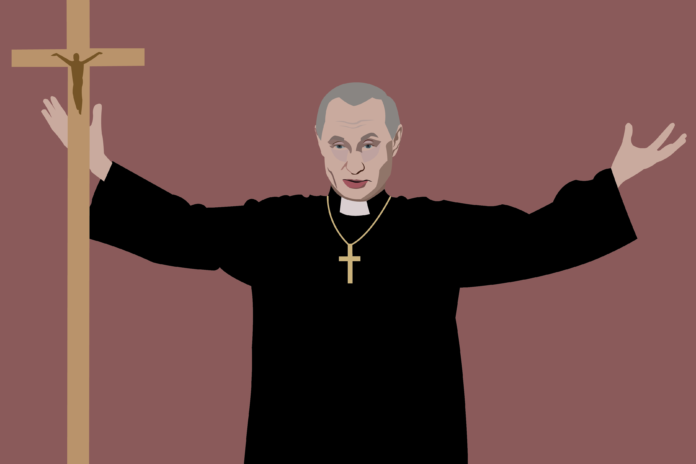Seventy years of atheistic rule later, God finds its way into the Russian constitution
Following decades of atheism in the Soviet Union, the resurgence of the Russian Orthodox Church signals a new nation. Today, television stations broadcast live sermons, citizens line up for holy water and Christmas trees light up Moscow’s Darwin museum. President Vladimir Putin even vowed to rebuild Christian churches in war-torn Syria back in 2017.
With plans to instate God’s will into the Russian constitution, the necessary separation between church and state diminishes.
Currently, the constitution defines Russia as a secular state, stating, “no religion may be established as a state or obligatory one.” Including God in the document would be a major amendment, especially given Russia’s complicated history with religion.
The amendment would also rule out gay marriage in Russia by officially defining marriage as a union between a man and a woman.
“We can and should address the fact that family and marriage are relations between a man and a woman,” said Duma lawmaker Pyotr Tolstoi. “If it is fixed at the constitutional level, this will remove a number of questions that they are trying to ask us in the European Union.”
Additionally, the amendment would notably exclude members of other religious groups, such as Muslims, who already face marginalization from the government. Russia’s Supreme Court even previously declared Jehovah’s Witnesses, a Christian denomination known for their outspoken beliefs, as an extremist organization.
Ironically, just 30 years ago, two-thirds of Russians claimed no religious affiliation.
During Vladimir Lenin’s reign of the early 20th century, atheism had a simple definition. Instead of disbelief in God, it implied the absence of religion entirely, a seemingly natural symptom of the Soviet Union’s development into a modern society.
Although churches and monasteries were still legal, officials found ways of shutting them down, like in the 1931 demolition of Moscow’s Christ the Savior Cathedral. In a time of social instability and reconstruction, the Orthodox Church was a political threat.
After successful attempts to demote the church, Stalin welcomed religion back into public life during World War II, seeing it as a way to promote patriotism and win the good will of allies. Once Nikita Khrushchev entered office in 1953, his anti-religious campaign transformed atheism from the absence of religion to the commitment to science and rationalism — a vision that aligned most with communist ideals.
Just before the fall of the Soviet Union in 1991, Mikhail Gorbachev brought the Orthodox Church back one last time before it became state-sanctioned. At the time, religion seemed to be the solution for the nation’s growing moral crisis. Indifference became the dominant principle.
In the post-Soviet era, Putin continues to invoke God in his public speeches, which gives the church a more prominent place in Russian political life. He presents himself as a defender of traditional morality by supporting conservative ideas. Despite his efforts, the truth remains as such — most Russians don’t abide by Orthodox morals.
Although the majority of Russians identify as Orthodox Christians, just 6% attend church weekly and only 17% pray daily. In 1920, the Soviet Union was the first country to legalize abortion. Today, the rate of abortions is more than double that of the U.S., even with strong objections from the Orthodox Church. Premarital sex and divorce are also less stigmatized in Russia than in other countries.
Russia seems like it would be the last country to put God into its constitution, especially with a former KGB member as president. Although some view it as a tactic to get Russians out to vote for the other proposed amendments, Putin’s trivial intentions have irreversible consequences.
Enshrining God into the constitution doesn’t make the government any more righteous than before — especially when many political decisions are free of moral substance. If the Orthodox church does not speak for everyone, then when the decisions of the people are concerned, it should not speak at all.
Written by: Julietta Bisharyan — jsbisharyan@ucdavis.edu
Disclaimer: The views and opinions expressed by individual columnists belong to the columnists alone and do not necessarily indicate the views and opinions held by The California Aggie







